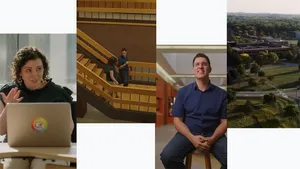Project Starline: Feel like you're there, together

People love being together — to share, collaborate and connect. And this past year, with limited travel and increased remote work, being together has never felt more important.
Through the years, we’ve built products to help people feel more connected. We’ve simplified email with Gmail, and made it easier to share what matters with Google Photos and be more productive with Google Meet. But while there have been advances in these and other communications tools over the years, they're all a far cry from actually sitting down and talking face to face.
We looked at this as an important and unsolved problem. We asked ourselves: could we use technology to create the feeling of being together with someone, just like they're actually there?
To solve this challenge, we’ve been working for a few years on Project Starline — a technology project that combines advances in hardware and software to enable friends, families and coworkers to feel together, even when they're cities (or countries) apart.
Imagine looking through a sort of magic window, and through that window, you see another person, life-size and in three dimensions. You can talk naturally, gesture and make eye contact.
We brought in people to reconnect using Project Starline.
We brought in people to reconnect using Project Starline.
We brought in people to reconnect using Project Starline.
We brought in people to reconnect using Project Starline.
To make this experience possible, we are applying research in computer vision, machine learning, spatial audio and real-time compression. We've also developed a breakthrough light field display system that creates a sense of volume and depth that can be experienced without the need for additional glasses or headsets.
The effect is the feeling of a person sitting just across from you, like they are right there.
Key breakthroughs include 3D imaging, real-time compression and a 3D display.
One of the things we are most proud of is that as soon as you sit down and start talking, the technology fades into the background, and you can focus on what's most important: the person in front of you.
Project Starline is currently available in just a few of our offices and it relies on custom-built hardware and highly specialized equipment. We believe this is where person-to-person communication technology can and should go, and in time, our goal is to make this technology more affordable and accessible, including bringing some of these technical advancements into our suite of communication products.
Project Starline being used in one of our Google offices.

To start that journey, we’ve spent thousands of hours testing Project Starline within Google as we connected colleagues between the Bay Area, New York and Seattle. We've also been conducting demos with select enterprise partners in areas like healthcare and media to get early feedback on the technology and its applications. We’re planning trial deployments with enterprise partners later this year.
We’re really excited about the progress we’re making with Project Starline, and the technology’s potential to solve the important problem of wanting to be together with someone even when you physically can’t. We look forward to sharing more later this year.







